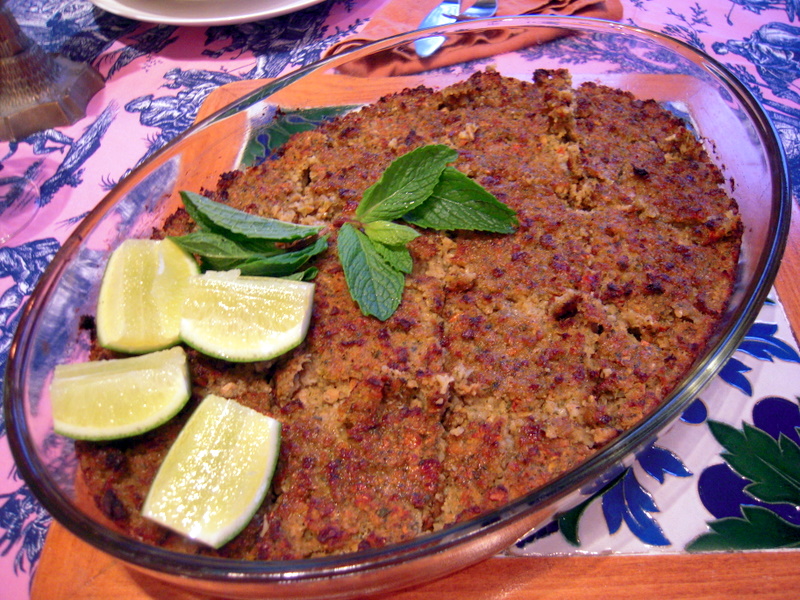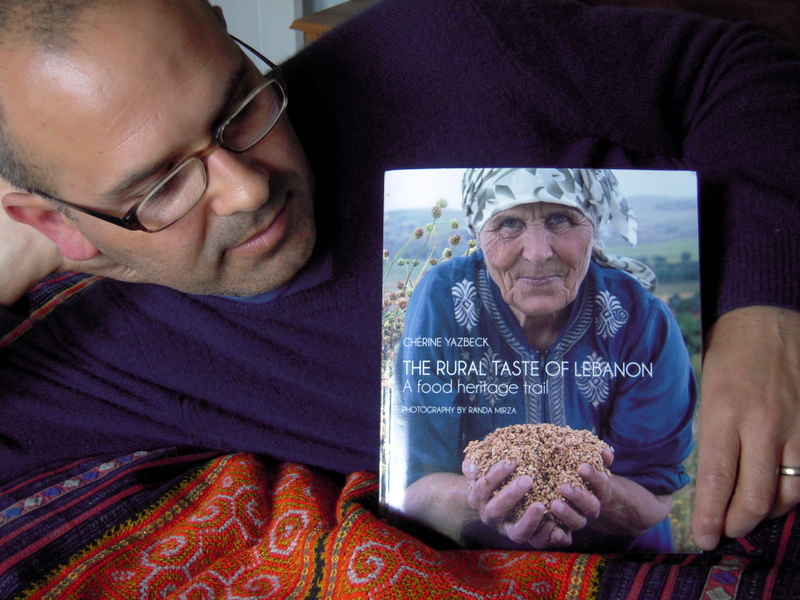Last month we received a beautiful and rare cookbook, The Rural Taste of Lebanon by Chérine Yazbeck, as a gift from our blogger friend, Joumana Accad, from Taste of Beirut. Joumana, thanks again for this exciting gift! The author, Yazbeck, focuses on traditional and less well-known foods from the Lebanese countryside. She seems bowled over by the richness of the food and culture. We were too. The photos are stunning and now we’d love to visit ourselves. Perhaps, one day when you’re in Beirut, Joumana, we can meet you for dinner?
The Rural Taste of Lebanon has so many recipes that it’s hard to decide which ones to try first. We’re fans of bulgur and recently enjoyed making Joumana’s eggplant bulgur casserole. Brazil, my homeland, has strong Lebanese influences in food. Quibe, the Portuguese spelling for kebbeh, is very popular there. According to the book, khichcar is the name for the vegetarian kebbeh. Quibe arrived in Brazil in the late XIX century with the migration of Lebanese, Syrian and Iraqi folk and became a sensation. You can even get it at an Arabic fast food chain, Habib’s, found in almost every shopping center throughout the country. Try Habib’s food when you visit Brazil.
Usually it’s made with ground beef in Brazil, though we had a marvelous vegetarian version while sipping red wine in Vitória. Vegetarian or not, quibe always has bulgur and spices. Sometimes it comes deep fried, but it can also be baked or even eaten raw. It can be stuffed with meat, dried mint, cheese, potato and other things. When deep fried, the quibe mix is shaped into small elliptical balls (just like an American football) and fried in hot oil. If you wish less fat, then I suggest that you bake it.
I’ve adapted this recipe from The Rural Taste of Lebanon using ingredients I had handy. The original called for oatmeal and chickpea flour as well as coarse semolina (smid). I didn’t have them. So I sort of improvised with tomato, soy protein and nutritional yeast (strange to have that stuff at home and not oatmeal). It turned out delicious anyway. I didn’t stuff this with anything but it didn’t need it either.
Homemade Vegetarian Quibe AKA Khichcar
1 cup fine bulgur
1 cup TVP (soy protein)
2½ tbsp flour
2 tomatoes
1 egg
1 egg white
1 cup packed fresh mint leaves
1 large onion
Salt
Black pepper
Dash of cinnamon
Crushed red pepper
Olive oil
2 tbsp nutritional yeast
2 tbsp mixed dry herbs: I used a bit of savory, oregano, thyme, paprika, cumin, coriander, cloves, mint, parsley and sumac
How to:
Soak TVP and bulgur separately, each in two cups of warm water for approximately 15 minutes. Drain separately. Cover the bottom of a colander with a clean dishtowel. Place drained bulgur in towel then lift and twist it closed to make a sack. Squeeze it to release as much residual water as possible. Set aside. Repeat the same drying process with the TVP. Mix bulgur and TVP with a fork. Set aside.
Pre-heat the oven to 375F.
Meanwhile place tomatoes, fresh mint, onion, salt, black and crushed red pepper in food processor, then pulse until blended. Add dry herbs, nutritional yeast, flour and pulse again to incorporate. Mix with the bulgur and TVP blend. Adjust flavor with more salt or pepper. Whisk egg and egg white together then fold into bulgur mixture.
Grease a large glass (9×13 inches) baking dish with olive oil. Spread kibe mixture with a rubber spatula evenly over dish. Drizzle with olive oil and bake for about 50 minutes. Increase temperature to 400F towards the last 5-10minutes to brown the top. Remove from oven and cool completely. Cut into squares or lozenges.
Serve with fresh mint leaves, wedges of lime and a generous drizzle of extra virgin olive oil.


Comments on this entry are closed.
Hegui
I was so moved by your post! To think that someone (or two persons actually!) so foreign to my culture of origin can embrace it like that! Wow! I am so happy !
Definitely plan on visiting Lebanon someday and we will welcome you with open arms!
Thank you Joumana.
Lebanon is on our to do list of countries we have yet to visit. It has such a beautiful ancient history.